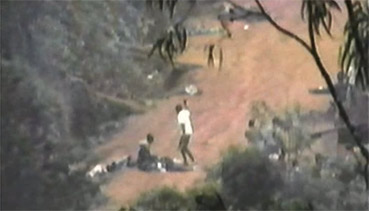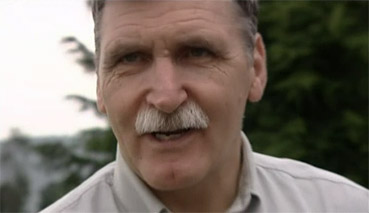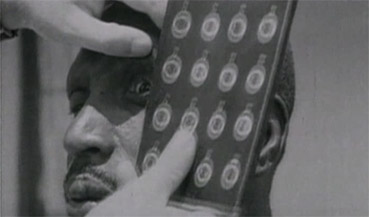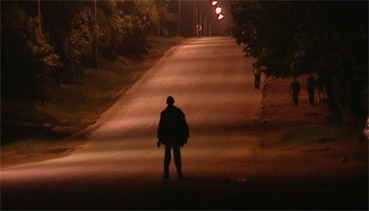"Who
the hell cared about Rwanda?" |
Lt. Gen. Roméo Dallaire |
|
"It's
the U.N." |
A Rwanda based U.N. worker giving an
excuse for bureaucratic incompetence. |
Ten
years ago, while the world's media centred on the fate of
a single black man in California, no one heard – or indeed
wanted to hear – the hundreds of thousands of screams coming
from the middle of Africa... What price human life?
In
Rwanda, central Africa, in 1994, while the world was hypnotically
distracted by the O.J. Simpson circus (sorry, trial), an
African government-backed militia and extremist factions
exterminated 800,000 human beings in one of the worst atrocities
of the late 20th century. Over a period of three months,
the Hutu soldiers and citizens of Rwanda shot and mostly
hacked to death their Tutsi brethren and Hutu moderates
in one of the most appalling acts of mass murder the world
has ever witnessed (or in this case, one which the world
had pointedly avoided witnessing). I have outlined the historical,
political and sociological aspects of the massacre in my
review for Hotel
Rwanda and won't dwell on them in this piece
except perhaps to underline one historical facet of this
awful event.

White
colonials (in this case Belgian) essentially divided the
population of Rwanda according to a series of physical attributes
that were measured with instruments that seem to have been
left over from Hitler's eugenic programme. In the fifties,
a nation was divided by bad science employed by an arrogant,
self-appointed white supremacy and kick-started an already
tribal based culture on the road to genocide. I mentioned
in Hotel Rwanda that it was not 'our fault'
but historically it seems I was mistaken. It feels simply
wrong to hear these native Africans speaking in perfect,
one assumes, Belgian French. Their colonial chains had become,
over successive generations, their unnaturally selected
method of verbal communication.
Hotel
Rwanda is a dramatic reconstruction of one hotelier's
brave attempts to save as many lives as possible during
the terrible carnage. Its perfect DVD companion, Shake
Hands With The Devil, is a character study, an
unflinching look at a man who played a central role in attempting
to arrest the unfolding atrocities (in Hotel Rwanda,
it's Nick Nolte's character who plays an interpretation
of Lieutenant General Roméo Dallaire). Dallaire cried
out for help and the world simply ignored him. He now lives
with the terrible burden of guilt (he's a staunch Roman
Catholic which cannot ease that particular burden) believing
that if he had done his job differently, lives would have
been saved. The overwhelming feeling after seeing the movie
is that Dallaire is the only one with this horrifying delusion,
one which led him to a park bench in Canada, having numbed
the grief with a great deal of alcohol culminating in several
post-traumatic stress syndrome driven suicide attempts.
It is this documentary's triumph that Dallaire's story is
presented with passion and heartbreaking depth. Not for
nothing did Robert Redford say that Shake Hands
With The Devil was a film his Sundance festival
was created for. Bravo Bob.
Imagine,
if you will, the United Nations. Yes, that emasculated organisation
that refused to give Bush and Blair an easy politically
sanctioned way out while they plotted to invade Iraq. Its
principal function (logically speaking) is to monitor the
world and assist in situations that require peace-keeping
forces. Rwanda was a powder keg and the fuse had been lit.
Dallaire's mission was to put the fuse out. He was given
a handkerchief and ordered to cover a football field. To
the man's credit, he really tried. But the world didn't
want to help. The world didn't want to know. Who cared about
Africa? Dallaire was to enforce the peace in a situation
that was clearly going to blow up in his face. He had so
little support from the United Nations that one wonders
why he was sent out there in the first place. Just because
he spoke French? If it was a token gesture then it was lost
on a beautiful country ripped apart by civil war and one
about to be hacked apart splattering the history books with
the blood of innocents.

The quintessential core of this fine documentary is the
character of Roméo Dallaire. We are invited to see
this appalling tragedy through his eyes and his eyes alone.
He had written a book because he did not want something
like this to ever happen again (who would?) and to exorcise
a few particularly horrific personal demons. He wanted the
world to know that international apathy costs more than
political leverage. Be warned. The snatched footage of machete
murder and the butchered bodies floating garishly in the
rivers of Rwanda take a strong stomach to handle. I doubt
if the film-makers wavered for a second in the decision
to include this footage (the director's commentary tells
us otherwise but these images are vital in grasping the
leaf of the blood soaked rainforest). You really do have
to see it front and centre because it is – by its scale
– almost impossible to believe.
The
director Peter Raymont (or editor, Michèle Hozer
– impossible to know whose creative decisions prevailed)
has peppered the film with visuals that act as tug boats
to the story. Sometimes they are a little too contrived
(nodding to and playfully linking to Dallaire's own voiceover)
and make you think of the film-makers' choices rather than
their subject; "the fog of war..." line on the
soundtrack cutting to a real ground fog in the Rwandan archive
footage. This is a small gripe as I have been as guilty
and more as a director and editor myself. Sometimes there
is simply not enough footage and you have to get creative.
The film follows Dallaire back to Rwanda with his wife (cheaper
than his psychiatrist as the director's commentary tells
us) ten years after the genocide reliving his story as he
revisits significant locations and meets significant people,
survivors of a bloodbath.
The
film opens and closes with Samuel Barber's Adagio for Strings
on the soundtrack. Those of you who either know (a) your
music or (b) your Vietnam movies will recognise this sublimely
haunting track as Oliver Stone's choix de jour for Platoon.
I'm not suggesting that the music has been overused (well,
yes, I am) but the justification is that it was played as
Dallaire wrote his book and one can't argue with that –
well, one can but it's such an amazingly haunting piece
that it's justified here in spades despite its now apparent
ubiquity. Without using a lot of poor quality library material,
director Peter Raymont had to trust his story and stay focussed
on Dallaire and the film is stronger for that decision.
Why?
Because
Dallaire is the perfect soldier. I say this with no personal
first hand knowledge of the man or his methods. It's simply
because if Dallaire is half the man as presented in this
documentary, then you would want him commanding you in war.
He never forgets or sidelines his humanity – his best asset.
He is visibly moved by situations and people. He is stunned
that the political world, specifically the U.N., can casually
dismiss Africans as sub-human (the subtext in all of his
contact with them). President Clinton, after the event,
apologised for not knowing what would happen and interview
subject U.N. Envoy Stephen Lewis airily dismisses this as
the lie he believed it to be. In a tense and fraught situation
(Dallaire's HQ is being attacked), the General plays music,
an absurd pro U.N. rock anthem, which makes all of his soldiers
smile despite themselves and their awful predicament. His
is a leadership with a capital 'L'.

In trying to find ways to express himself, Dallaire falls
back on religious terminology (he is a religious man after
all), a convenient and unfortunately straitjacketed way
of processing his experience. Dallaire is staunchly moral
and in his job (enforcing his masters' and his own moral
code on to others) he has to believe what he is doing is
in all ways 'right'. One cannot argue with the idea of 'peace
keepers'. To invoke 'evil' and 'the devil' as a way to understand
what happened in Rwanda is a little too narrow for me. As
critic Geoff Pevere said on the second commentary, these
terms provide us with a way to understand the inconceivable.
But understanding is the booby prize. How can anyone understand
the will of half a nation to cut down the other half in
a hundred days?
In
a scene when Dallaire is hauled up before a Belgian M.P.
and made accountable for the deaths of Belgian soldiers,
the west's complicit act of deliberate obfuscation becomes
the most morally unworthy act of the movie (in a genocide
this is saying something). It brought to mind Sigourney
Weaver's observations in Aliens when confronted
with a political team leader, Burke (played deliciously
by Paul Reiser). "You know Burke, I don't know which
species is worse. You don't see them fucking each other
over for a goddamn percentage!" The Belgian was playing
to the crowd, gaining political points while a good man
is smeared. They have a face to face but by then – to the
world's media – it's too late. Accuse a man of 'x' and the
'x' sticks regardless of his innocence. But then I am only
seeing this film's point of view. See how difficult the
truth is to mine? But we have the festering bodies as evidence,
the horror that turned man against neighbour. A sane, humanitarian
man would have stopped at nothing to prevent such a tragedy.
Nothing
was all Dallaire got in return for being a decent man in
a morass of indecency – both African and Western.
Originated
on 16x9 DV and various format sources of library material,
the film looks as good as can be expected and to the casual
viewer there is no remarkable downside to the 1.75:1 visuals
despite their obvious lack of quality (in our post modern
days, these images would look 'wrong' if they were perfect
in quality). The editor has chosen to add a slow motion
strobe on the actuality that makes things clear when mixing
Dallaire's re-visit and 1994's 'memories' via news bulletins.
The
Dolby 5.1 soundtrack really uses the surround element and
the sub woofer gets a few moments, mostly musical and one
utterly horrific. It is very clear that a great deal of
time has been taken in the mix. It is always clear – Dallaire
is a very good speaker and overall this aspect of the production
is particularly noteworthy.
Commentary
by Director Peter Raymont
Commentary by Toronto Star Critic, Geoff Prevere
There
are two commentaries and I have never encountered two for
one movie that were more polarized in style. The first is
by director Peter Raymont. His is laconic, respectful and
one must say, somewhat sparse. The second, by Toronto Star
critic, Geoff Pevere, offers us practically no pauses for
breath – it's extraordinary, almost as if he was told that
for every pause, he would receive an electric shock. This
relentless stream of comment is about as satisfying as the
other more laid back one mostly because you tend to zone
out at certain times because of their styles. With too many
words, you step back and I had a similar reaction to the
commentary of too few words. This isn't to say both are
not enlightening but both do cover ground the film has already
covered with more aplomb.

To
be fair, there are deliberate pauses in Pevere's commentary
– over the still living victims of the genocides near death
and pathetic in the true sense of the word and Dallaire's
take on the 'drunken' nature of genocidal violence but to
his credit, Pevere did describe his commentary as "babbling"!
Both reveal more about the men performing them than about
the film itself – that is not to be taken as a criticism.
Commentaries are points of views. Both men have such respect
for the film (based on the subject and effectiveness of
the storytelling of course) that in some way, they tiptoe
carefully as if a pensive Dallaire is in the room with them.
But Pevere does make a very good point, that Dallaire's
non-ironic ideals were so horribly ignored, perverted and
exterminated in Rwanda and that's what affects him deeply
(aside from the heavy cloak of guilt at being unable to
save lives).
Interview
with Director Peter Raymont (4x3, 7:43)
This touches on Raymont's relationship with his subject
and it's no surprise that Dallaire was treated very well
by the crew and he rewards them with a presence that has
integrity running out of every craggy pore. There isn't
a moment in the film where you think he's playing to the
camera.
Excerpt
Reading by Lt-General Roméo Dallaire
(4x3, 5:41)
All dressed up, medals displayed, this is Dallaire's video
address to the tenth anniversary memorials held in Kigali
in 2004. He reads two extracts from his book and both are
quite startling. He recalls meeting with the Interhamway,
the Hutu extremists who used mass media to kick start the
atrocities. There was still blood on one of their representative's
cuffs as they shook hands. Dallaire mentioned he had emptied
his gun before the meeting just in case he was moved to
shoot them all.
They
admitted that they were the perpetrators in a line that
sickens and repels. Out of respect of the U.N. and the character
of Dallaire, they agreed "not to massacre near U.N.
protected sites...", a practical admission of guilt.
It's a chilling memory. His second extract is more of a
coda summed up with the words that the 21st "must become
the century of humanity"... No luck so far.
Photo
Gallery
Chief Photographer Peter Bregg took pictures of Dallaire's
return to Rwanda and offers commentary on all 31 stills,
some family stories, some pertaining to Dallaire. An extraordinary
moment happens in his commentary over the schoolbook that
lays in a church were thousands were shot and hacked to
death and the bodies left to rot as a memorial to their
suffering. The recollection catches Bregg unawares and the
emotion comes through just for an instant. It's startlingly
moving.
This
is an important work for all sorts of reasons but aside
from alerting us to the horror we can inflict on one another,
it is also a character study of a man of conscience, goodness
and integrity. The fact he was a general in the U.N. is
heartening. Someone in power somewhere saw fit to give this
man a command. This is a good thing. They didn't see fit
to give him what he needed to do his job. In terms of lives
lost, this was a catastrophic thing. Shake Hands
With The Devil is a solid document of a singular
atrocity. I just hope that we can learn from its message.
|